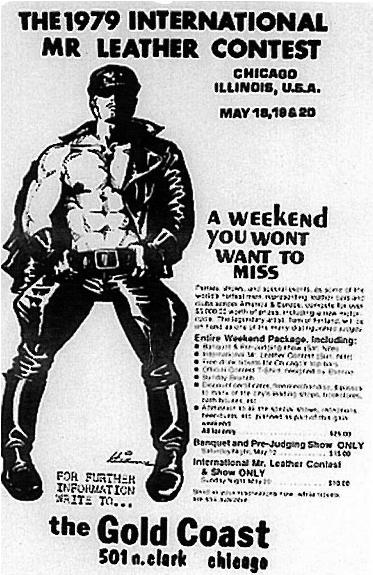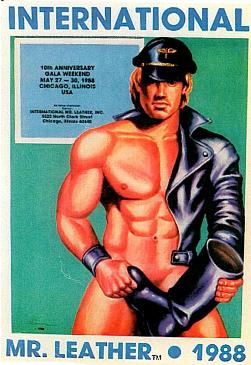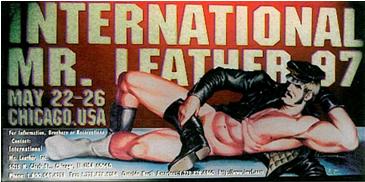Bound for Glory: An Interview with Leatherman Author Owen Keehnen
By Tony Peregrin in News on May 24, 2011 9:00PM

Source: Leather Archives & Museum and International Mr. Leather.
What started out as something of a bar gimmick at Chicago’s iconic Gold Coast bar—reportedly the birthplace of the first leather competition—the International Mr. Leather (IML) contest is now a multimillion dollar event that attracts thousands of people from all over the world to Chicago every Memorial Day weekend.
In 1972, the first Leatherman contest took place on top of a pool table at the Gold Coast, and the first-place prize was a used motorcycle, according to Leatherman: The Legend of Chuck Renslow, a new biography of IML founder and Chicago businessman Chuck Renslow. At that point, the competition—then known as the Mr. Gold Coast Contest—featured contestants doing just about anything to ignite the audience, including dragging "slaves" on stage. In the span of a few short years, the contest became so popular that the event far exceeded the bar’s capacity, and in 1979, International Mr. Leather was born. There was a solid turn-out that first year: About 400 people paid $25 for the weekend package.
“In an age of almost overwhelming sexual oppression, Renslow was a key player in providing the necessary means for liberation,” note Chicago journalists and authors Tracy Baim and Owen Keehnen in the opening pages of Leatherman. “Suddenly there wasn’t such overwhelming isolation when it came to exploring sexuality and lifestyles beyond hetero and beyond the borders of “vanilla.” Renslow had an impact on tens of thousands by helping people recognize their sexual desires, their kinks, and their fantasies.”
Three decades later, Renslow, IML organizers, and participants are still blazing trails. Last year, when Tyler McCormick—IML’s top contender out of the 52 entrants—was announced, the event made history by crowning the contest’s first trans winner, and the first winner to compete in a wheelchair. IML had broken through yet another senseless border, another unnecessary wall. (Ties that bind, indeed.)
Just days before IML 2011, Chicagoist managed to harness Keenhen for an interview where he shared his thoughts on what is likely the largest leather convention in the world.

Source: Leather Archives & Museum and International Mr. Leather.
Owen Keehnen: They chose the name International Mr. Leather because a lot of the choices like Mr. America and Mr. Universe were already taken. At the first couple of IMLs, Chuck wanted to have the contest move from city to city but no one was willing to take that on—so it remained in Chicago.
Once they decided it was going to be international, Chuck had [his lover] Dom Orejudos (also known as the artist “Etienne”] design a scorching hot leather poster. Once they had the poster, Chuck got the Damron travel guide and sent copies of the poster to every leather bar and organization he could find—worldwide. The next year, they even had a friend of theirs, Herb, translate the poster into German. The posters were so slick and sexy that people took notice. People heard about it, they came [to Chicago], had a great time, came back again, and brought friends.
C: In Leatherman, you quote Jon Krongaard—IML executive committee member and vice-president of the Leather Archives & Museum—as jokingly referring to IML as a kind of “dysfunctional family reunion.” Explain what means for those who are unfamiliar with the IML culture.
OK: I think Jon was referring to this feeling that all these people are coming together to celebrate things that oftentimes set them apart. Their kink, their fetish, is a bond and IML is a great place to strengthen those bonds, to explore, to learn, and to have a place of acceptance. That feeling of acceptance, especially by a population which is often on the fringe, is a real feeling of family—that “these are my people” feeling. I think AIDS also solidified the family so to speak, because this group was decimated by the epidemic and rather than destroy them it strengthened them. It’s a celebration as well as a legacy.

Source: Leather Archives & Museum and International Mr. Leather.
OK: Well, to understand this, you have to realize that Chuck has a huge Daddy complex, a huge need to protect and provide. He felt that if IML was going to remain this place for people to come together and explore, that it also needed to be a safe place—especially for the less experienced members of the community.
I think Chuck felt that he wanted to protect those who might not be aware of all the dangers and risks in barebacking. It’s my understanding this only prohibited the sale of barebacking porn at the Leather Market. Chuck isn’t policing people, he’s only saying that if you want to buy or sell barebacking porn, that’s fine, and it’s your right—you just aren’t going to do it at IML. More than from a place of judgment or anything along those lines, I think the ban came from a paternal place and a desire to protect.
C: In the book, you describe the controversy surrounding IML 2011 and the situation concerning the Unite H.E.R.E. Local 1 hotel workers union. Can you briefly describe this conflict and Renslow’s response?
OK: The hotel worker’s union wanted IML to boycott the Hyatt to support the union’s campaign, which would result in a huge financial blow to the hotel chain. Though IML is sympathetic to the issues that the union is fighting for, the contract they had with the Hyatt had already been signed, and IML really couldn’t afford to shoulder the financial consequences of breaking that contract, not to mention the practical multi-hotel logistics and problems of moving the event to other host hotels. Chuck, I think, is very sympathetic to the union, and it’s my understanding that in this situation there just wasn’t a great deal of room for negotiation.
C: A lot of people in the leather community have said that competitions, such as IML, are no longer as relevant as they once were, citing dropping numbers of competitors at these events. How does Chuck respond to this viewpoint?
OK: To Chuck it is all about the networking. It is about bringing the community together to celebrate and to party. It is a gathering of the tribe, so to speak. IML is the setting but it isn’t the real story. It is like what I said before, that feeling of acceptance and togetherness, and the wonderful feeling of empowerment that it can bring, is the real importance of IML. Chuck knows and appreciates the meaning and importance of family more than most, and to him, it is another manifestation of his “family.”
Authors Tracy Baim and Owen Keehnen will be joined by Chuck Renslow at the Leather Market at International Mr. Leather this weekend at the Hyatt, at 2 p.m., for book signings on Friday, Saturday, and Sunday.
Leatherman: The Legend of Chuck Renslow is available in print and as an e-book on Amazon.com. It is also available at Women & Children First and Unabridged bookstores in Chicago.